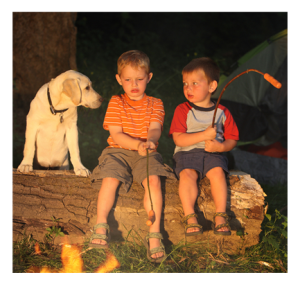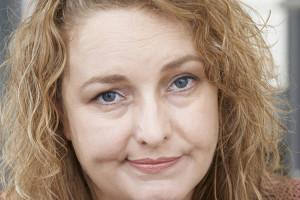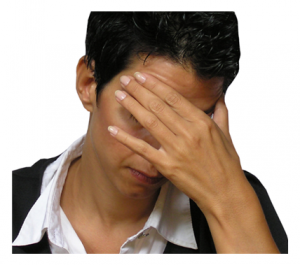Sleep-away camp? It was something beyond an occasional afternoon with friends around a carefully tended fire or seated at a picnic bench in a state park, assisted by adults as we melted chocolate on graham crackers for smores or toasted weenies on sticks.
 Or better yet, marshmallows in all their golden, gooey splendor.
Or better yet, marshmallows in all their golden, gooey splendor.
Sleep-away camp was for those with a fondness for a state of nature I never desired – diving off a pier, hiking through the woods, surviving nights in a bunk-bed battleground of warring pre-teens taking pleasure in food fights and pranks.
At least, that’s how I saw it, with no desire for kayaking or canoeing, or any variation of facing the elements. Day camp for two weeks each summer sufficed, and was comfortable.
There were laps (in a pool). There were art projects (in neat classrooms). A well-groomed field was the site for volleyball and archery. There were games and songs and snacks, followed by a short bus ride home in the afternoon.
Camp Cool It… for Digital Dependents?
I never felt deprived for lack of an overnight experience, though apparently the get-away, the retreat, the camp for grownups is being popularized these days. And I’m not talking the health and fitness variety, nor the creative seclusion that writers, poets, and artists may seek to commune with their own better angels.
We now have the the digital disconnect, the forced friending of the self sans the cell, the tablet, the iPhone, the notebook – or any other social media or digital means of communication. And it’s done cold turkey, which sounds more like rehab than recreation if you ask me.
In “A Trip to Camp to Break a Tech Addiction,” The New York Times paints a pretty (harsh?) picture of the latest in our pursuit of mindfulness – away from our obsessions to communicate through technology, describing an “adults only summer camp” dedicated to disarming the digitally driven.
Relating his experience, Matt Haber writes:
A little more than 300 people had gathered there for three days of color wars, talent shows, flag-raisings and other soothingly regressive activities organized by Digital Detox… teaching technology-addled (or technology-addicted) people to, in the words of its literature, “disconnect to reconnect.”
“F” for Free Play
 Mr. Haber expresses the initial discomfort at being separated from his iPhone, which most of us understand. While I find myself nostalgic as he mentions rifle ranges transformed into (old-fashioned) typewriter banks (for the writers in attendance), I wonder how I would fare deprived of my devices. I doubt it would be pretty.
Mr. Haber expresses the initial discomfort at being separated from his iPhone, which most of us understand. While I find myself nostalgic as he mentions rifle ranges transformed into (old-fashioned) typewriter banks (for the writers in attendance), I wonder how I would fare deprived of my devices. I doubt it would be pretty.
Theoretically, I took a few days off not long ago, but the reality? You would have found me composing copy on a smart phone, stretched out on a sandy shore.
As I did in fact put away my technology for chunks of time, I’d give myself a D for disconnect, rather than an F, but had I been able to detach more completely, I would have done so with enormous satisfaction.
How many other adults would give themselves an F for going with the flow, for spontaneity, for being able to leave behind their worries (and their gadgets)… even for a short time?
In another example of camping life, Huff Post Parents features an interesting take on the summer experience we purchase for our children. Written by Dr. Peggy Drexler, “The Case Against Summer Camp” focuses on our American tendency to crowd our kids’ lives with activities, even in their months off from school. Gone are the once lazy days of summer.
Dr. Drexler writes:
… what if the best thing for a child is to spend a summer doing absolutely — nothing?
The tendency to overschedule children’s time is a hard habit to break, and camp quite nicely fits into patterns most American parents establish during the typical overbooked school year. But in many instances, a summer spent at camp deprives a child of important “free play” time that those months have historically provided.
Cultural Contradictions, Absent Alternatives
Personally, I couldn’t agree more. However, the dual career couples I have always known – themselves overworked, overtired, and wed to grueling schedules to pay their bills – use summer camp as a substitute for school. In other words, camp serves partially as a means to provide children an experience of outdoor sports, arts and crafts, and (no doubt) computer activities, but at least as much as a babysitting service though children are no longer babies.
 Camp may be the only means parents have to continue working, as the days of Mom At Home and allowing kids to run free are generally speaking a thing of the past – if not the former, surely the latter.
Camp may be the only means parents have to continue working, as the days of Mom At Home and allowing kids to run free are generally speaking a thing of the past – if not the former, surely the latter.
Moreover, even if we have the bucks to get away for a week or two, we may not have the vacation time.
So we have infrastructure issues when it comes to families, in terms of time off (let’s not forget you must “accrue” it each time you change employers. And we have inadequate options for childcare when kids aren’t in school and parents are working. Summer camp becomes a difficult to budget (but necessary) fact of life for many – at the very least, day camp.
We Know the (Work-Family Life) Problems. And the Solutions?
I find the juxtaposition of these two views into “camp life” to be indicative of where we are as a culture, two sides of the same coin revealing our contradictory values.
Both grownup digital detox and “mindfulness” get-aways for adults, and activity-jammed camps for kids say a good deal about the haves and the have nots (money enough to foot the bill), but also reflect the treadmill we can’t seem to jump off. We are going, going, and only “gone” long enough to briefly recharge (if possible), in order to, well… keep going.
The fact is, the sort of “free play” that Dr. Drexler mentions would do us all a world of good, especially the adults. But that free play isn’t free at all. First, we must pay for a social infrastructure that allows us to be “off” when we need to reconnect with ourselves and our families, and far more often than two or three weeks a year.
You May Also Enjoy
Well….MY idea of a grown-up getaway involves spas and little chocolate candies on my pillow at night. And you’re right…free play is very, rarely every free. 🙂
Any with chocolate sounds good to me, Lisa. (Female Soul Food?)
A thought provoking post! I think it’s kind of sad that adults are paying to go to ‘adult’ camp and unplug. Can’t we unplug on our own? I guess it’s the novelty of being a kid again but I think it all comes back to balancing daily life. You’re right about the cost to families but if the children love the overnight camp then they are getting something valuable regardless of the reasons for being there. I’m with Lisa above, spa and chocolate would make for a nice ‘adult’ retreat…
It is a bit sad, Lisa. I think you’re right.
So do we think Lisa will have us all over for a sleepover… We could manage on a living room floor with pillows and blankets, as long as there’s chocolate. 🙂
Love this! “We are going, going, and only “gone” long enough to briefly recharge (if possible), in order to, well… keep going.”
‘Tis so true… Have you seen the the bulletin boards that entice people to head to the forest, or at least the great outdoors? Hands holding a turtle as opposed to a nintendo paddle? etc… Pure genius…
if it works…
We spent a couple hours riding four-wheelers with friends last night, covering several hundred acres of land. I hate to say, but I had my cell in a pack on my back, not so I could talk and text (there’s not service in them there parts…) but for the camera I use to take all the photos for the pieces I write.
I’d have to ponder this a little more, but, really, I think our lifestyle choices are often the reasons that we “pay for that free play” as you say. Many of us live at or above our means, which perpetuates that whole “work hard” mentality. Maybe we need to fully invest in the “work hard, play hard” strategy, to buy into it whole-heartedly…
Definitely a thought provoking article… And a tantalizing remedy: I think a bunch of us should plan that adult retreat. I’ll pack the chocolate on ice. 😉
I hear you on the “choice” aspect, Annah Elizabeth. But I believe that’s also a bit of cultural mythology that leads to thinking we have more control than we actually do.
Our society has become all about a constant (and growing) squeeze that choice may not play into at all. Priorities remain ours to set, but we remain bound to certain realities in this society to do with options, resources, and occasionally – luck.
I’m a single mother in the trenches of elementary school kiddos. As the sole breadwinner (at least for now), I don’t have the luxury of staying home with my kiddos during the summer…but I remember and those carefree, unscheduled days of summer where I woke up and never knew what might unfold. I hire a college girl to come to our home as a sitter. I put her on the family pool pass and library cards and I feel that my children are getting at least a taste of the freedom of summer. They do not have to be up and out by a certain time and can linger in jammies, create forts, fashion shows, parades, etc. To ward off boredom, they still get to visit our local pool, park, library and such. I’ve been so grateful for our babysitter – second summer now.
As an adult getting unplugged, we are so blessed to live near Smoky Mountain National Park and try to head up there once a week or so. There is no cell or internet service, so it forces me to unplug for at least a few hours. In addition, I love to journal and the mechanical process of writing on paper is therapeutic for me!
These are important topics. Thanks for the conversation!
I’m with you on the journaling, Missy June. Real pen, real paper, real arm movement. It’s wonderful.
Bravo to you for your efforts to give your children “at least a taste of the freedom of summer,” i.e., the “carefree, unscheduled days of summer where I woke up and never knew what might unfold.” I think that having as much of that freedom as possible is critically important to children, and it sounds like you are doing a very good job of making sure yours do. That your children “do not have to be up and out of the house by a certain time” and are free to devise their own play was a big part of what my kids missed most when they had to get to some activity every summer weekday. As your children get older (or if they already are old enough), you may want to allow them to play with neighborhood kids (if any are free), with your babysitter overseeing in whatever way you would be if you were home.
As far as adults getting unplugged goes…. With very rare exceptions (twice in the last ten years), my husband and I (now living alone together) unplug every weekend.
(The exception is keeping one cell phone with us when we are away from home, so that we can be available if either of our adult children, who live far away, has an emergency.)
Being self-employed, and making clear to clients that we are not available on weekends, allows us to do this, and frankly, that is an extension of the reasons we each started our own business practice just after our first child was born 33 years ago. Being self-employed was risky at the start and financially costly, but it has been well worth both because of the freedom it has given each of us to have a life outside of work. Unplugging has become essential to not only having personal lives, but also to our being present where we physically, and both are priorities for us.
I wish everyone was free to have time off from work and to decide whether to unplug during it.
Thank you for raising these important issues.
It took some time to learn to leave the “Ranch” and smartphone at home during vacations. I have good people around me and I have learned to let go (even if I lose some work).
As to camps for adults….wow. Buy a kayak, bike, etc and just leaving electronics behind.